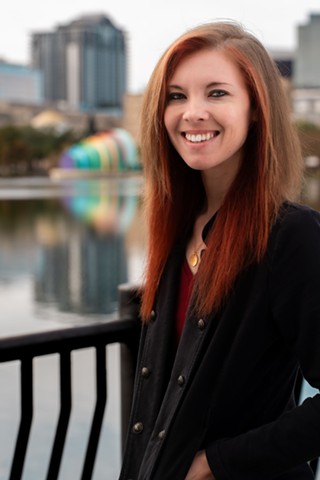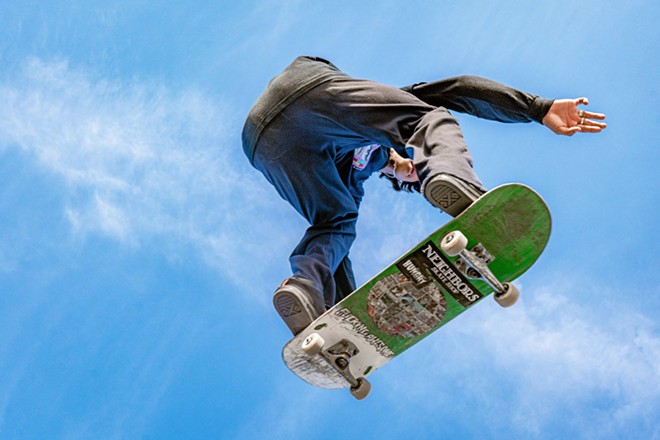
Florida may not be the first place your mind goes when you think of skateparks or skateboarding culture. And that’s fair: There’s a notable dearth of them in the Sunshine State compared to places like Long Beach in California — particularly parks that are well-kept, with infrastructure that’s suitable for all skill levels.
Even so, Florida actually has a rich cultural history of skateboarding. Florida, for instance, was the birthplace of the “ollie,” one of the most well-known skateboarding tricks. Its origins date back decades, to the 1970s.
“Our skate parks were so horrible back then, so kinky and over-vertical, that I kind of did an ollie by accident,” recalled Alan “Ollie” Gelfand, the inventor of the trick, in a story published by the Miami New Times in 2002. “That's how we learned to do it, here in the skate parks of Florida.”
Zach Moldof, a Florida native and executive director of the youth empowerment non-profit Skate Bud, today hopes to leverage that history to further a campaign to expand the number of skateparks in Florida communities that lack them, and to improve existing parks in communities that do.
For Moldof and his wife, Tiffany — the director of Skate Bud — it’s not a self-serving mission. Their nonprofit’s campaign, Legalize Wheels, is largely focused on empowering kids, particularly at-risk youth.
Local to Orlando, the couple’s campaign was borne out of their own difficult upbringings, as victims of childhood criminalization, and the benefits they’ve seen skateboarding provide for at-risk youth, both in Florida and their previous home in Los Angeles.
There, with dozens of skateparks in Los Angeles County alone, they worked with the city’s Parks & Recreation department to make skating more accessible for disenfranchised communities, before packing up and moving to Central Florida in 2022.
Moldof, a graduate of the University of Central Florida, already had some familiarity with the area, which offers comparatively fewer skating opportunities than L.A.
“It became a huge need to begin to advocate to improve the skatepark infrastructure, to be able to demonstrate what could be achieved through social services and public health when these spaces are activated with programming,” Moldof told Orlando Weekly.
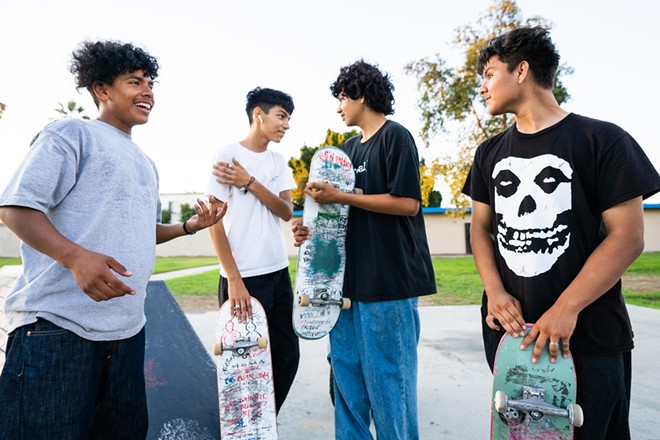
Reaching kids where they're at
Skate Bud’s advocacy-focused programming is multipronged: They provide free skateboards to kids, teach free skating lessons, and offer mentorship for both personal and career development. As someone who struggled to find his path in life after a troubled childhood, Moldof recognizes how important a helping hand can be.
Skateparks have, historically, carried negative connotations in the mainstream as gathering sites for social misfits, miscreants and troublemakers. Racial and gender stereotypes — such as the notion that skateparks are only for straight white men — has also warped public perception.
Moldof and other skateboard advocates reject this outdated characterization, and say skateparks can offer many benefits both for kids and communities at large.
A 2019 report from the University of Southern California’s Pullias Center for Education, based on a two-year study and titled “Beyond the Board,” outlines how skateboarding can help facilitate a sense of community, offer a healthy outlet for physical activity, and foster skills like perseverance and resilience.
It can also broadly help kids relieve stress and have fun — something that may not seem especially significant on its face, but which can, in this day and age, actually hold a lot of weight.
The coronavirus pandemic, for instance, proved a particularly challenging time for children’s mental health. More than one-third of U.S. high schoolers in 2021 reported experiencing poor mental health during the pandemic, according to a CDC survey, and 44% reported feeling persistently sad or hopeless in the past year. This has been particularly pronounced in teen girls.
And sure, there are other ways for kids to get active. Hit up a basketball court, for instance. Moldof argues, however, that unlike traditional sports that have long-standing institutional support, skateboarding can offer other, unique benefits for kids who have experienced trauma or have an unstable home environment.
“The way that I understand it, from my personal experience, is like when you are exposed to significant trauma as a young person, you stop feeling like you have control,” he explained. “And then you try to seize control in whatever means you have access to.”
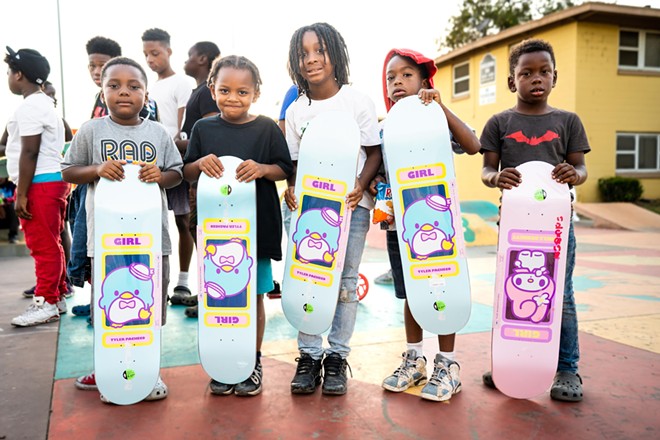
Seizing control may look like trying to find some way to cope with, or respond to, that sense of powerlessness that a lack of control can instill — a sense that may be even more pronounced in people from disenfranchised communities who live in poverty, or who are otherwise marginalized on account of their socioeconomic status, skin color, ethnicity or other characteristics.
Childhood trauma is a major risk factor for substance use disorders and mental health conditions such as eating disorders, which can have long-term consequences for a person's health and well-being, and their ability to fully participate in society. Kids who experience trauma — such as domestic or sexual abuse — may also act out or engage in other risky behaviors that can have long-term consequences without early intervention.
Moldof says that traditional sports may not be able to meet the needs of every kid who has had these experiences.
“If you're a young kid who's experienced significant trauma, and then you're being told by the city or the county, like, ‘Oh, participate in our football program! That's going to help you' ... without a doubt, that will work for some kids,” he says. “But for the majority of kids who are the ones that are willing to go out and get a gun, or like, do something self-destructive, that sports programming where an authority figure tells you what you can and can't do before you have access to the benefits, it simply doesn't work.”
Skateboarding, he argues, removes that. “It's all about self-actualization,” he explains. “It's all about, you know … ‘I decide what trick I want to try next. I decide if I did it well enough, or if I want to do it again. I decide if I'm gonna go skate today. I decide if I'm done skating right now.’”
Research has found that conventional youth sports can help reduce the long-term risk of anxiety and depression in people with childhood trauma, but they can also be cost-prohibitive for low-income families. So can gym memberships.
Furthermore, most team sports have a winner and a loser. You can argue all day in favor of the benefits of not being a “winner” all the time, but Moldof argues that for a kid who’s already marginalized, who’s getting that societal message that they’re screwed unless they follow the rules outlined by the powers that be, sometimes you just need to take winning and losing out of the equation.
“We have no means for really acknowledging or addressing the negative aspects where you're not going to win every time,” Moldof says.
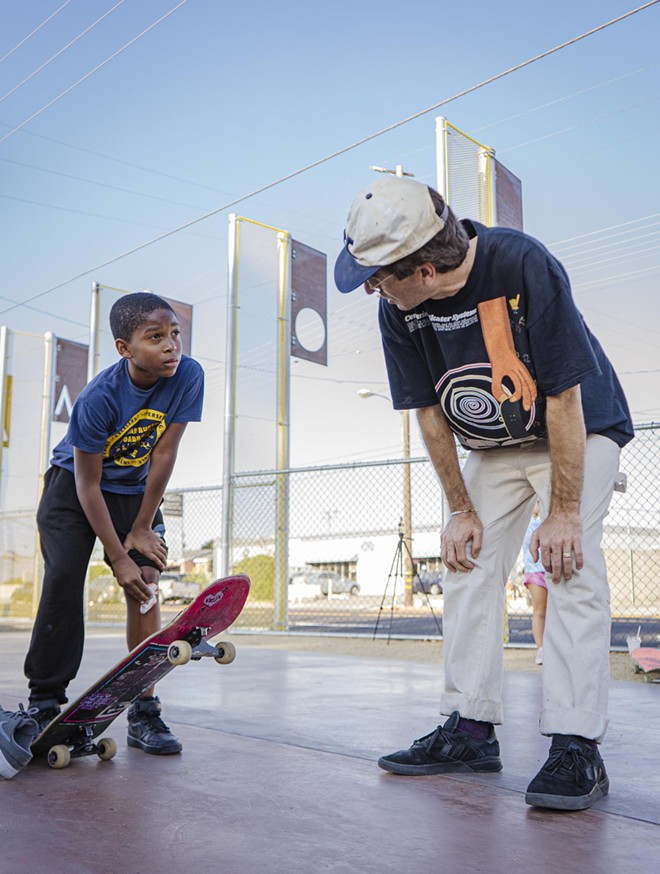
Few and imperfect opportunities
Access to quality skateparks in Florida, however, is relatively scarce. Unlike other common youth sports, skateboarding is not generally available through institutional settings, like schools or gym facilities, where children often get introduced to athletic activities.
According to Skate Bud, Florida (population 21.8 million) has about 153 public skateparks, whereas there are 90 in Los Angeles County alone (population 9.8 million). Of Florida’s skateparks, the nonprofit estimates that roughly 93% fall below basic usability standards.
Florida statutes give local governments and public institutions the ability to create public skateparks that are free of liability, but current law does not provide any guidelines for usability, to help account for factors like accessibility, infrastructure or maintenance.
Florida isn’t just the birthplace of the ollie. It’s also home to the world’s oldest operating skate park.
tweet this
Take the Orlando Skate Park, for example, located in the Milk District near downtown. The park’s not dilapidated, sure. But its infrastructure, Moldof argues, may be “prohibitive” to people who are new to skating. “It prioritizes a type of skateboarding that you can't learn at that park,” he explains. “You have to be an expert at it from skating somewhere else.”
It also highlights a division between ramp-style skating and street-style skating. The latter can be more accessible, because all that’s really needed for street skating is smooth terrain, but ramp skating, with its half-pipes and dramatic drop-ins, is what’s prioritized in most of Florida’s skateparks.
Skate Bud has a history of working with local governments and other community organizations to develop skatepark programming, and has been in talks locally with staff and elected leaders in Orange County and Winter Park. The city of Orlando, Moldof says, has been less consistent in their communications with him (and he hasn’t been afraid to call them out on this during public comment period at city council meetings).
Their latest step in the Legalize Wheels campaign, however, has an even broader goal — not just to add skate programming, but to increase the number of skateparks in specific sectors of Florida and to upgrade infrastructure at the ones that already exist.
State Rep. Anna Eskamani, D-Orlando, has put in a state appropriations request this year for $3.7 million to fund Legalize Wheels, which would go toward developing skateparks and skatepark programming in 10 “sectors” covering 19 counties — Orange as well as Alachua, Brevard, Broward, Charlotte, Duval, Gadsden, Hillsborough, Jefferson, Lee, Leon, Miami-Dade, Palm Beach, Pinellas, Polk, Sarasota, Seminole, Volusia and Wakulla.
The bulk of those funds — $3.1 million — would be invested in the construction of new skateparks and renovations to existing sites. There would also be a $553,000 investment in staffing, training, mentorship and consultant work; and salaries for an executive director and assistant director, totaling a modest $45,000 and $48,000 respectively, according to the request.
In a statement to Orlando Weekly, Rep. Eskamani said that she believes the requested funds would be able to demonstrate the positive impact that skateparks can have for communities.
“Most communities in Florida still do not have access to skateparks, nor is there robust programming to utilize already existing skateparks for youth development and community intervention,” she said. “We want to change that, and this state funding request would be transformational towards that effort.”
The nonprofit Skate Bud has also submitted a $25,000 grant request for fiscal year 2024-25 with the Florida Department of Arts & Cultural Affairs, specifically for the creation of an annual Florida Skate Heritage Fair that would be held in Orange County.
Moldof envisions it as a “world-class exposition” that would not only provide local job opportunities, but also emphasize skating’s roots in Florida in a way that is both celebratory and educational.
Florida isn’t just the birthplace of the “ollie,” after all. It’s also home to the world’s oldest operating skate park — Kona Skate Park — in Jacksonville. Then there’s Skateboard City in Daytona Beach (RIP), which was the first concrete skatepark to open in the United States. The Bro Bowl, in Tampa, was also the first U.S. skatepark to be listed on a national registry of historical places. Other skating techniques and pivotal figures in skateboard culture — such as skateboard legend and Gainesville native Rodney Mullen — also have ties to Florida.
“People believe that skateboarding comes from California and from surfers, and that's true in part. But street skating really starts here,” said Moldof. “And it will be so beneficial for our state to begin to take ownership of that heritage.”
This story was updated at 1:03 p.m. Monday to include all 19 counties in the proposed Legalize Wheels sectors.
Follow us: Apple News | Google News | NewsBreak | Reddit | Instagram | Facebook | Twitter | or sign up for our RSS Feed


